Introduction
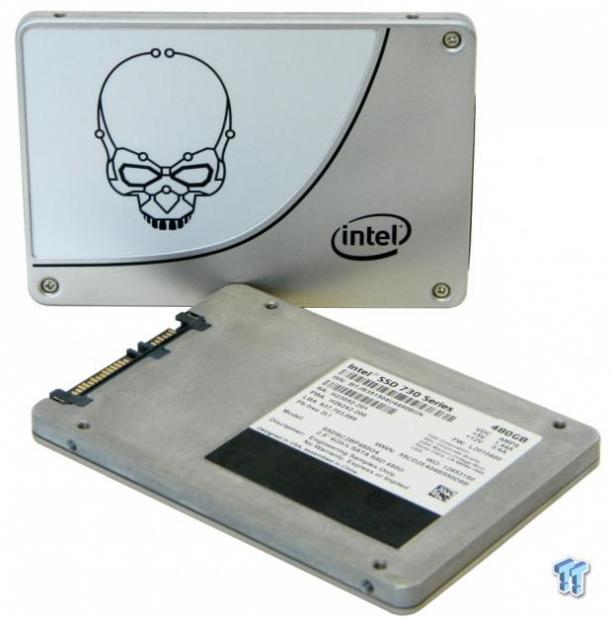
Intel designed their DC S3500 SSD to deliver superior performance in an enterprise setting. The DC S3500 features host power loss protection, a genuine Intel controller, and a premium BGA packaged IMFT Flash array. Intel engineered the DC S3500 for consistent performance, scaling, and endurance in a datacenter environment.
We know from experience that SSDs designed for the enterprise sector can deliver superior performance in an enthusiast setting. For example, Seagate's 600 Series Pro, which is a direct competitor with Intel's DC S3500 SSD, proved itself a superior performer when utilized in an enthusiast setting, delivering one of our best two-drive array performances to date, proving that an enterprise pedigree makes for a superior enthusiast SSD.
Intel, looking to launch an enthusiast SSD, decided to tap its venerable enterprise-class DC S3500 and sell it as an enthusiast-class SSD. Intel's newly launched 730 series is essentially a DC S3500 with reworked firmware and a little special sauce under the hood. That special sauce comes in the form of an overclocked flash processor and 100MHz NAND flash.
As many of you know first-hand, overclocking your processor can yield a huge performance gain. Overclocking a flash processor is exactly the same concept. The 730 comes factory overclocked, and as such, is a good deal faster than the DC S3500.
The best enterprise-class SSDs are designed scale to well and provide consistent, predictable performance in a steady state. Intel places a lot of emphasis on drive scaling. Be it an enterprise or enthusiast setting, how well your drives scale in RAID has a huge impact on overall array performance. At TweakTown labs, we've documented cases where an eight-drive array composed of drives that scale well can outperform 16-drive arrays, despite having nearly identical single-drive performance.
Intel's 730 is not our performance champion when implemented in a single drive setting; it's close, but several Toshiba flash-based SSDs are capable of better overall steady state performance. However, RAID may be an entirely different story, and here's why: IMFT flash tends to provide close to 100 percent scaling (double the performance) when comparing a single SSD to a two-drive array in a steady state. Toshiba flash tends to provide about 60 percent to 70 percent scaling in real-world performance for a two-drive array in a steady state.
Will superior drive scaling produce a new two-drive RAID champion? Let's dig in and find out!
Specifications, Pricing and Availability, Drive Details & Test System Setup
Specifications, Pricing and Availability
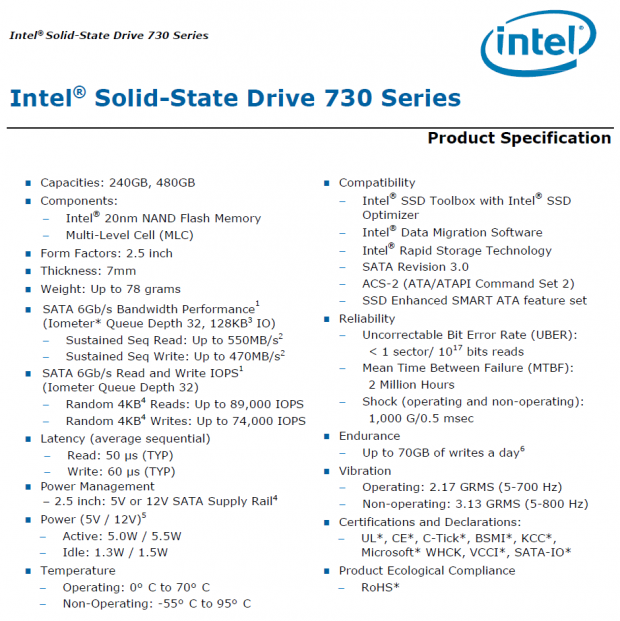
Intel's 730 Series 2.5-inch SATA III SSD is available in two capacity sizes, 240GB and 480GB. Specifications list the 2.5-inch 730 Series SSDs as having a bandwidth performance of up to 540MB/s sequential reads and 490MB/s sequential writes. 4KB random read performance is listed at up to 89,000 IOPS, and 4KB random write performance is listed at up to 74,000 IOPS.
When you purchase a retail packaged Intel SSD, you not only get a fine product, but you get value added features like an accessory kit, Intel's SSD Toolbox, and Intel's Data Migration Software for easy maintenance and easy drive cloning. Our test drives came in bare OEM packaging, but the retail packaged 2.5-inch 730 ships with an accessory kit that includes SATA power and data cables, a sticker, and a software disk. Intel warranties the 730 Series SSD for an industry-leading 5 years.
Since this is a RAID review, we are going to focus on performance rather than features. For a more in-depth look at the Intel 730's feature set, I will refer you to Chris Ramseyer's extensive review of Intel's 730 Series SSD.
Drive Details - Intel 730 Series 480GB SSD
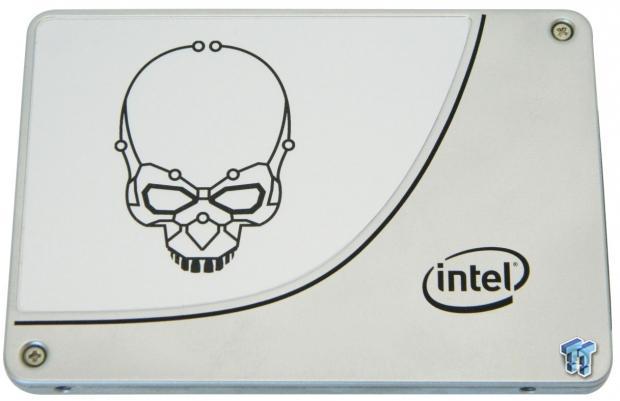
Our drives arrived bare, so we do not have anything to show you as far as packaging goes. The top of the drive's enclosure is formed from a piece of sheet aluminum, which is left natural in color. There is a cool looking white swoosh shaped sticker with a skull emblazoned on it. There are four screws that affix the top of the drive's enclosure to bottom and sides of the enclosure. Three of the screws are visible, and the fourth is located under the drive's swoosh shaped sticker, providing evidence of tampering.
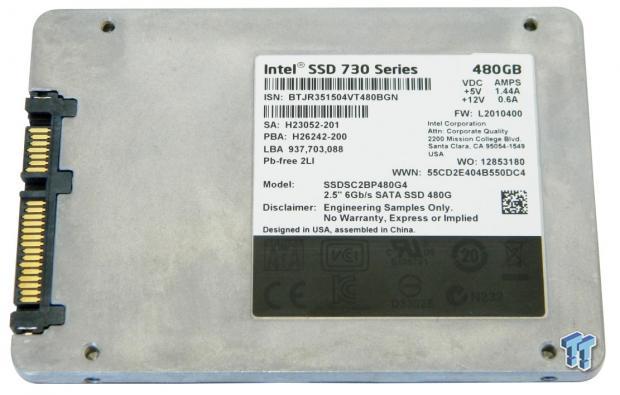
The bottom and sides of the drives enclosure are formed from a single piece of cast aluminum. There is a manufacturer's sticker located on the bottom of the drive's enclosure. The sticker lists the drive's capacity, shipping firmware, model number, serial number, and various other relevant information.
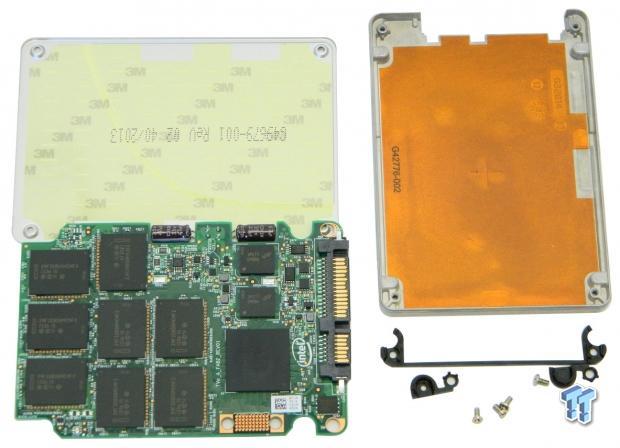
Here's what the drive looks like completely disassembled. On this side of the PCB, there are eight Intel branded 20nm BGA NAND packages, 2 DRAM packages, 2 capacitors, and an Intel Flash Processor. Both halves of the drive's enclosure have what appear to be some sort of Mylar material affixed to the inside.
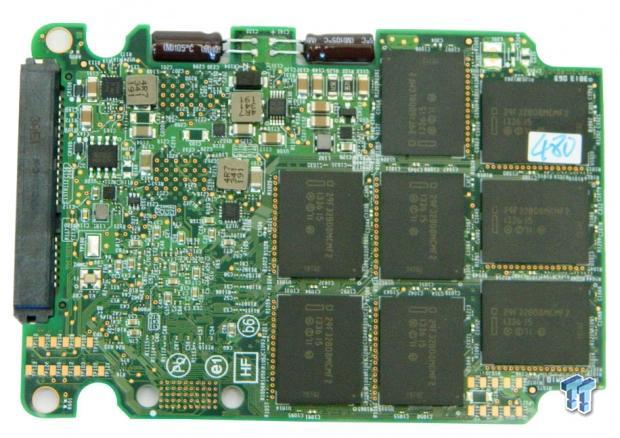
On the opposite side of the PCB are an additional eight Intel branded 20nm BGA NAND Packages.
Test System Setup
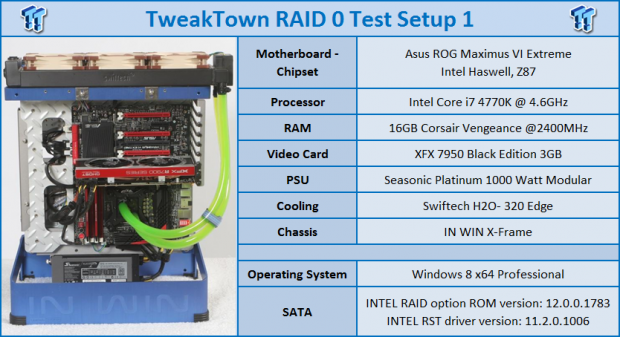
- Drive Properties
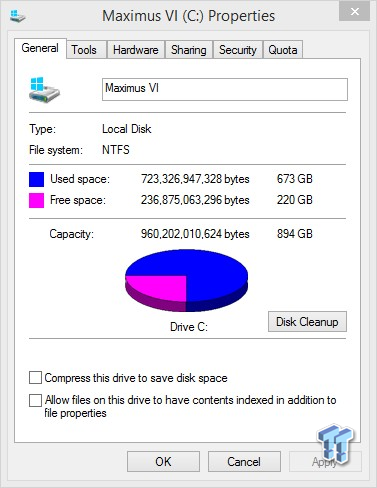
The majority of our testing will be done with our test drive/array as our boot volume. Our boot volume is 75 percent full for all OS Disk "C" drive testing, to mimic a typical consumer OS volume implementation. We are using 64K stripes for all our arrays. Write caching is enabled.
All of our testing includes charting the performance of a single drive as well as a RAID 0 array of our test subjects. We are utilizing the Windows 8.1 64-bit OS for all of our testing.
PRICING: You can find the Intel 730 Series SSD (480GB) for sale below. The prices listed are valid at the time of writing but can change at any time. Click the link to see the very latest pricing for the best deal.
United States: The Intel 730 Series SSD (480GB) retails for $437.27 at Amazon.
Canada: The Intel 730 Series SSD (480GB) retails for CDN$876.94 at Amazon Canada.
Australia: The Intel 730 Series SSD (480GB) retails for $650.99 AUD at Mighty Ape Australia.
New Zealand: The Intel 730 Series SSD (480GB) retails for $689.99 NZD at Mighty Ape NZ.
Synthetic Benchmarks - ATTO, Anvil Storage Utilities, CrystalDiskMark & AS SSD
ATTO
Version and / or Patch Used: 2.47
ATTO is a timeless benchmark used to provide manufacturers with data used for marketing storage products.
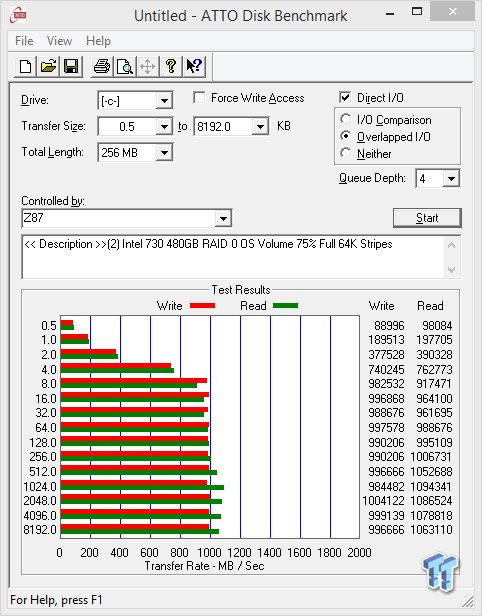
Transfers quickly ramp up, reaching full performance by 8k transfers. Read and write transfers are well balanced, strong, and consistent throughout.
Sequential Write
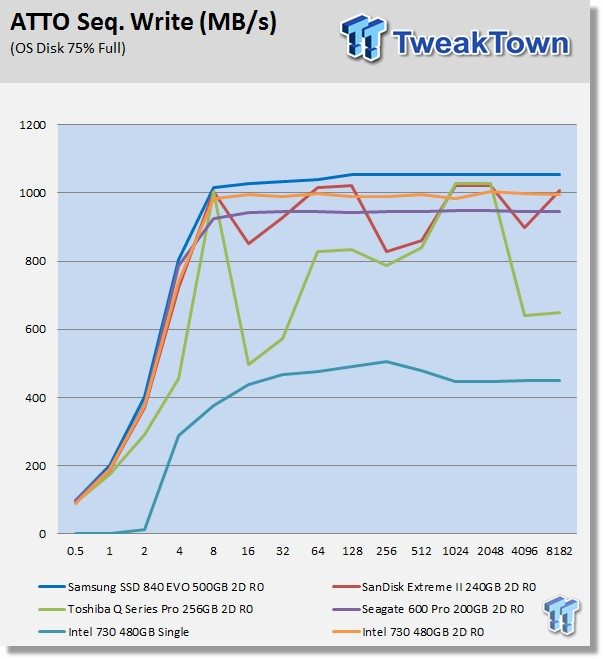
Write performance is second only to our EVO array. Write caching and RAID scaling are delivering incredible performance, something like 100 times the performance of a single with micro-transfers in the .5-2KB range.
Sequential Read
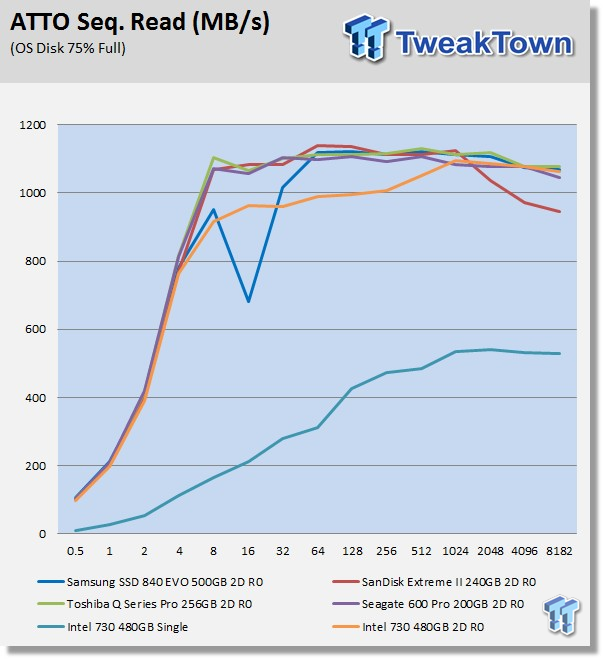
Sequential read transfers ramp up fast. Our 730 array is running with the pack at transfers up to 2k. By the end of the test, our 730 array is again running with our leaders.
Anvil Storage Utilities
Version and / or Patch Used: RC6
Anvil's Storage Utilities is a storage benchmark designed to measure the storage performance of SSDs. The Standard Storage Benchmark performs a series of tests; you can run a full test; just the read or the write test; or you can run a single test, i.e. 4k QD16.
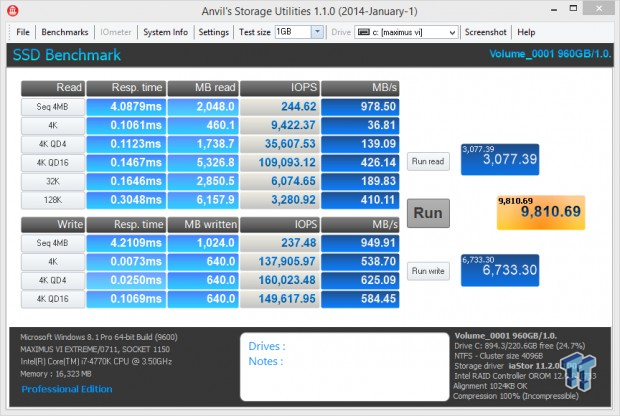
Approaching 10,000 points, our two-drive array is delivering awesome performance--most notably read performance.
Read IOPS through Queue Depth Scale
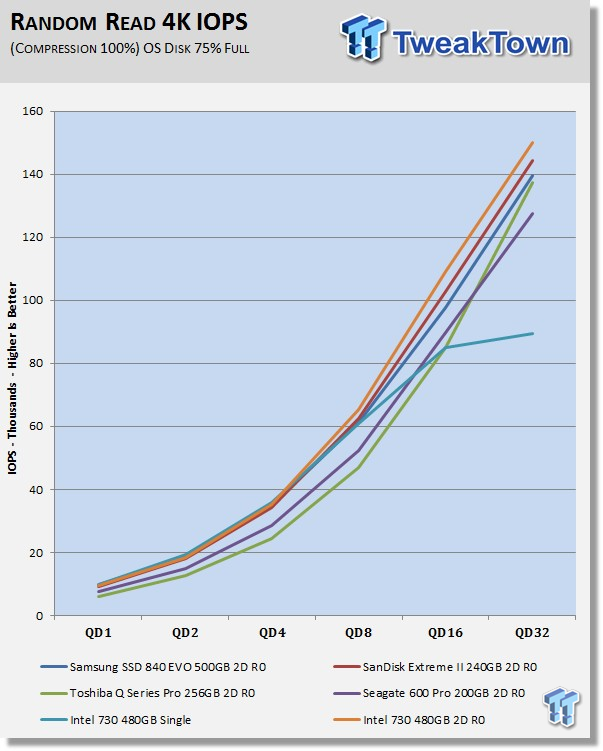
Our Extreme II array has owned this test for a while. Today, our 730 series array becomes the new landlord.
Write IOPS through Queue Scale
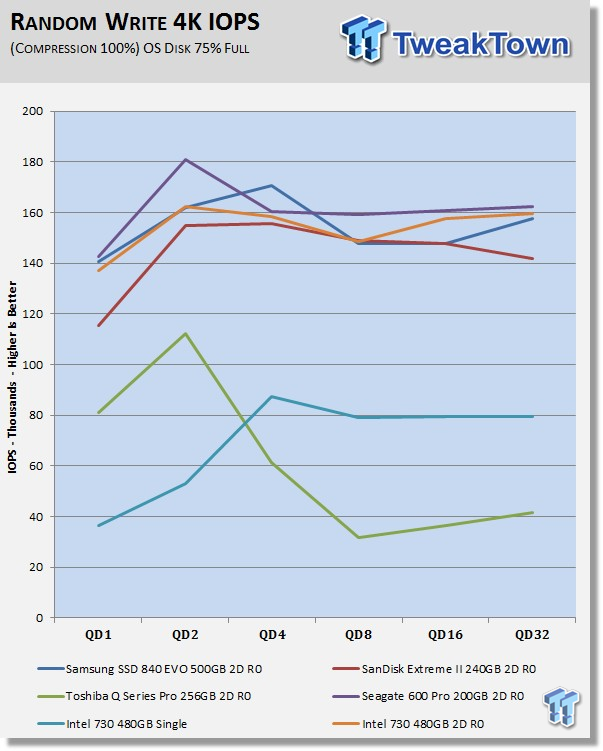
We are going to call this a second place finish for our 730 series array. Our heavily over-provisioned 600 Pro array leads the pack, and our EVO array is displaying a faux write performance with all test data fitting within its "Turbo Write" emulated SLC layer.
CrystalDiskMark
Version and / or Patch Used: 3.0 Technical Preview
CrystalDiskMark is disk benchmark software that allows us to benchmark 4k and 4k queue depths with accuracy.
Note: Crystal Disk Mark 3.0 Technical Preview was used for these tests since it offers the ability to measure native command queuing at 4 and 32.
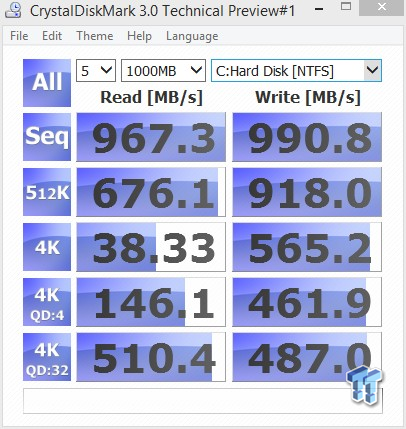
We see strong performance across the board. However, sequential read speed as well as write performance at QD4 and QD32 could be better.
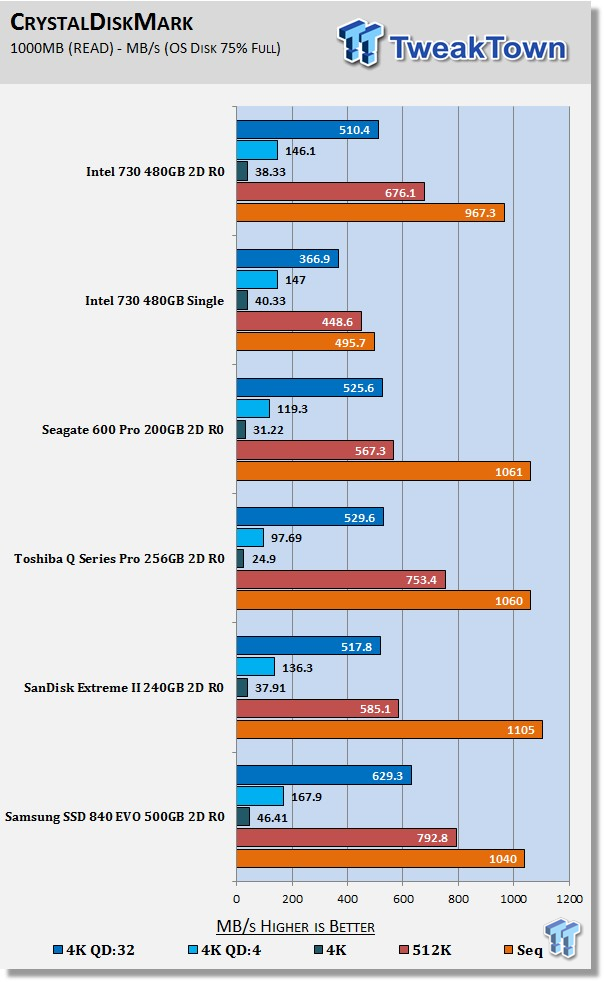
Sequential read performance is nothing to write home about. Random read performance, on the other hand, is excellent across the board.
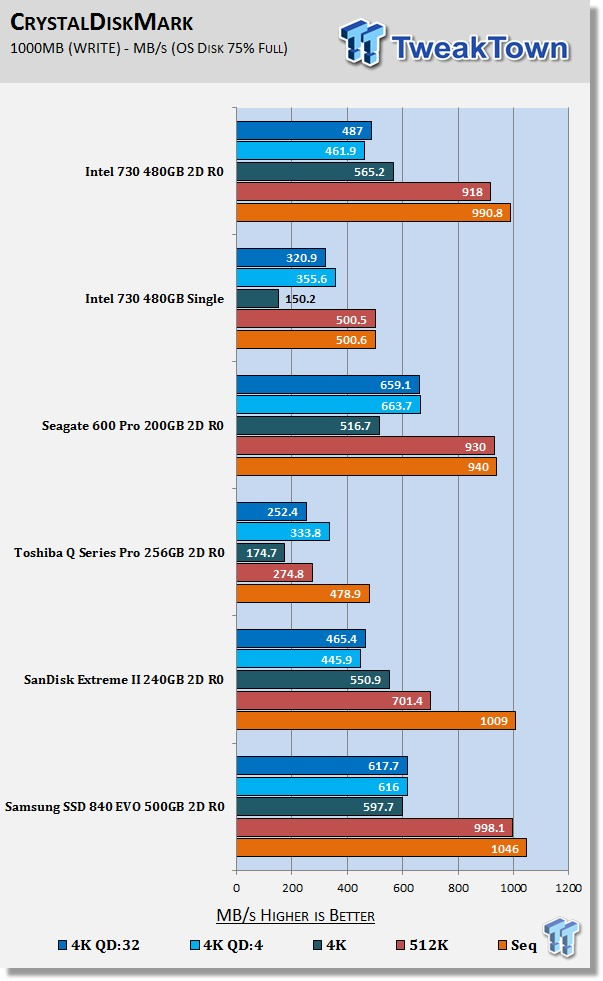
Sequential write performance and, most importantly, 4k random performance is exceptional.
AS SSD
Version and / or Patch Used: 1.7.4739.38088
AS SSD determines the performance of Solid State Drives (SSD). The tool contains four synthetic as well as three practice tests. The synthetic tests are to determine the sequential and random read and write performance of the SSD.
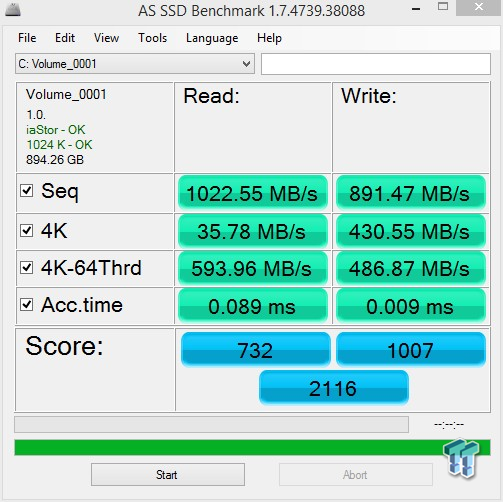
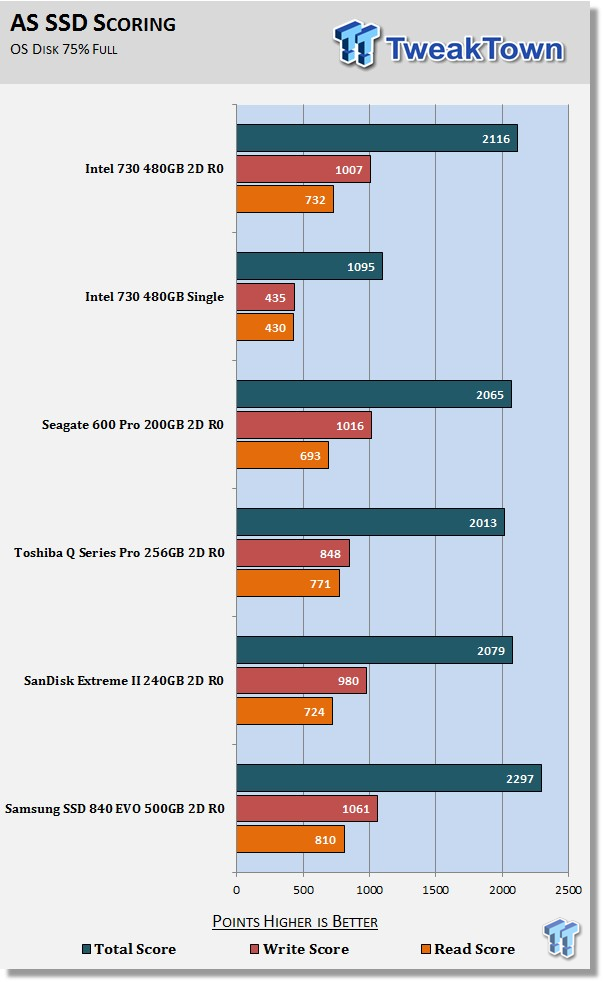
We see excellent performance, second to our EVO array. With the last of our synthetic testing completed, let's move to our light usage model testing, which will give us a better idea of what's under the hood of our 730 series array.
Benchmarks (Trace Based OS Volume) - PCMark Vantage, PCMark 7 & PCMark 8
Light Usage Model
We are going to categorize these tests as indicative of a light workload. If you utilize your computer for light workloads like browsing the web, checking emails, light gaming, and office related tasks, then this category of results is most relevant for your needs.
PCMark Vantage - Hard Disk Tests
Version and / or Patch Used: 1.2.0.0
The reason we like PCMark Vantage is because the recorded traces are played back without system stops. What we see is the raw performance of the drive. This allows us to see a marked difference between scoring that other trace-based benchmarks do not exhibit. An example of a marked difference in scoring on the same drive would be empty versus filled versus steady state.
We run Vantage three ways. The first run is with the OS drive/array 75 percemt full to simulate a lightly used OS volume filled with data to an amount we feel is common for most users. The second run is with the OS volume written into a "Steady State" utilizing SNIA's guidelines (Rev 1.1). Steady state testing simulates a drive/array's performance similar to that of a drive/array that has been subjected to consumer workloads for extensive amounts of time. The third run is a Vantage HDD test with the test drive/array attached as an empty, lightly used secondary device.
OS Volume 75% Full - Lightly Used
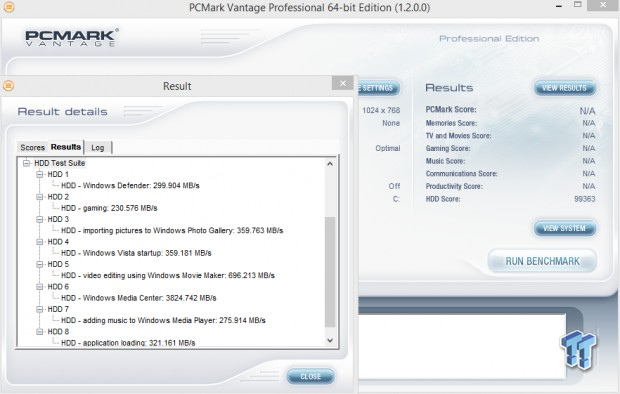
OS Volume 75% Full - Steady State
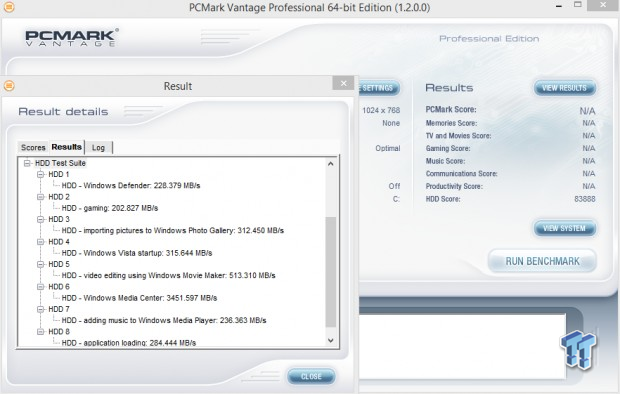
Secondary Volume Empty - Lightly Used
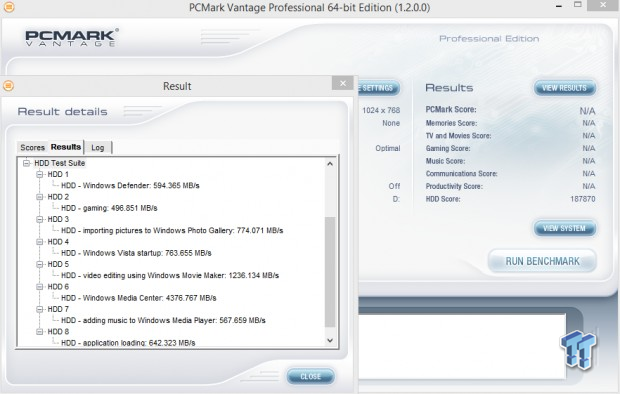
As you can see, there's a big difference between an empty drive/array and one that's 75 percent full/used and one that's in a steady state.
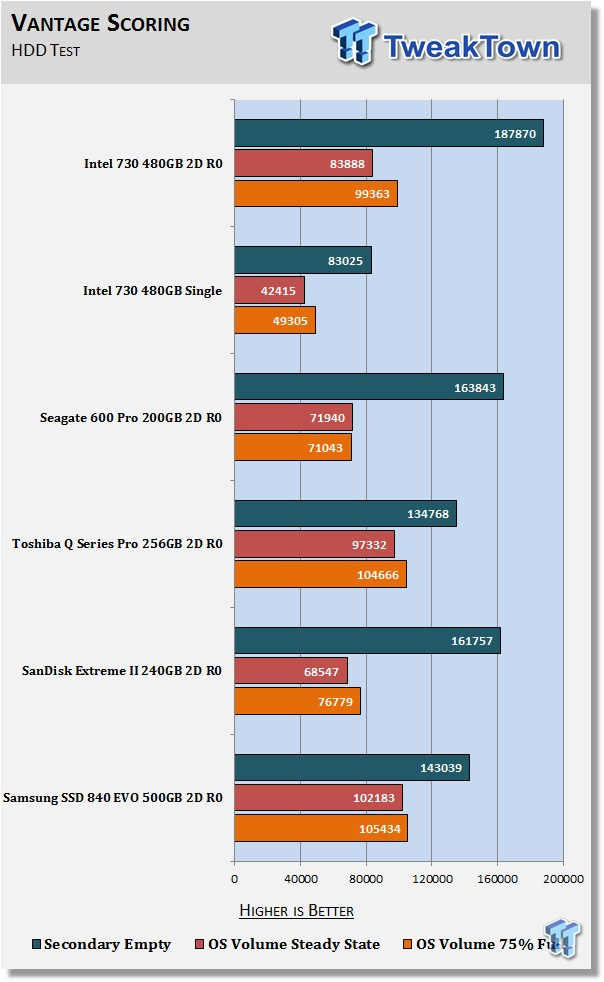
The important scores to pay attention to are "OS Volume Steady State" and "OS Volume 75% full." These two categories are most important because they are indicative of typical of consumer user states.
When a drive/array is in a steady state, it means garbage collection is running at the same time it's reading/writing. There is a huge difference in performance between a single drive and a two-drive array.
We don't place too much importance on an empty secondary attached array, but 187,000 points is by far the best performance we've seen from a two-drive array running 64K stripes. This result is a good example of why configuring an array properly makes a big difference. I recently saw a score of 97,000 points on a review site for the exact same empty secondary attached array, and they were "amazed" by that score. Suffice it to say they could have configured their array better.
PCMark 7 - System Storage
Version and / or Patch Used: 1.4.00
We will look to the Raw System Storage scoring for RAID 0 evaluations because it's done without system stops and therefore allows us to see significant scoring differences between drives/arrays.
OS Volume 75% Full - Lightly Used
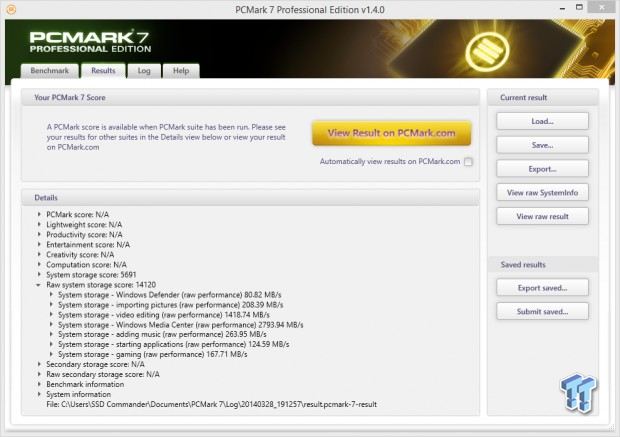
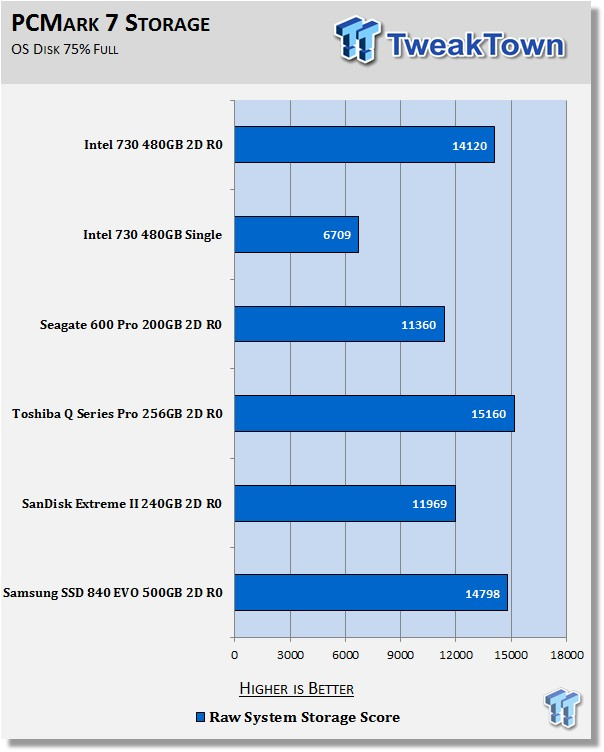
Toshiba's Q series Pro really eats up this test. Our 730 Series array puts up an excellent performance in its own right, but can't overtake our EVO and Q Series Pro arrays.
PCMark 8 - Storage Bandwidth
Version and / or Patch Used: 1.2.157
We use the PCMark 8 Storage benchmark to test the performance of SSDs, HDDs, and hybrid drives with traces recorded from Adobe Creative Suite, Microsoft Office, and a selection of popular games. You can test the system drive or any other recognized storage device, including local external drives. Unlike synthetic storage tests, the PCMark 8 Storage benchmark highlights real-world performance differences between storage devices.
OS Volume 75% Full - Lightly Used
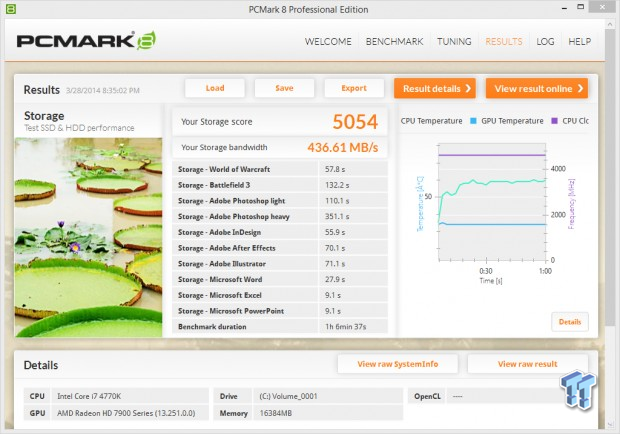
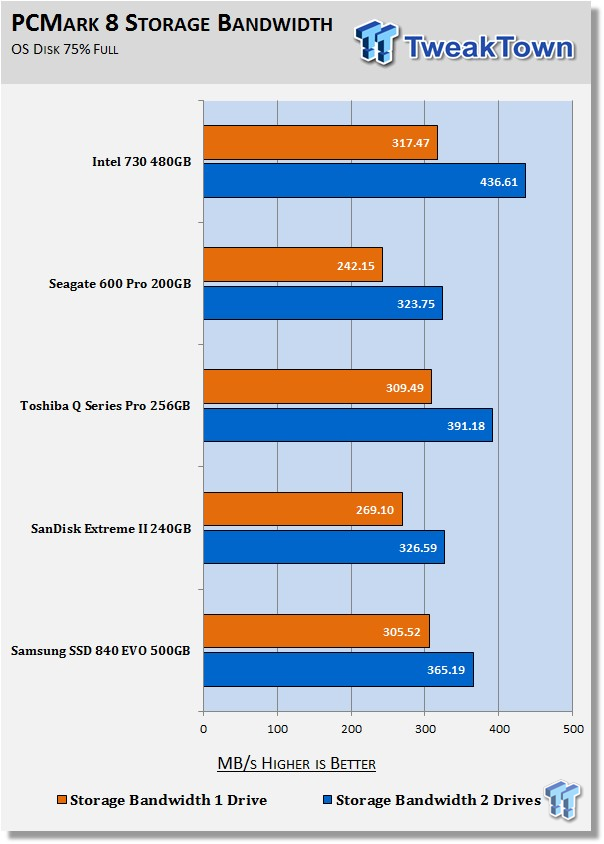
Our 730 Series array easily dominates the competition. We are beginning to catch a glimpse of IMFT NAND's superior scaling. We will look to our last round of testing, our Heavy Usage Model, to see if the 730 is just another benchmark babe or if it's got what it takes to be crowned TweakTown's RAID champion.
Benchmarks (Secondary Volume) - Disk Response & Transfer Rates
Iometer - Disk Response
Version and / or Patch Used: 1.1.0
We use Iometer to measure disk response times. Disk response times are measured at an industry accepted standard of 4k QD1 for both write and read. Each test is run twice for 30 seconds consecutively, with a 5 second ramp-up before each test. The drive/array is partitioned and attached as a secondary device for this testing.
Write Response
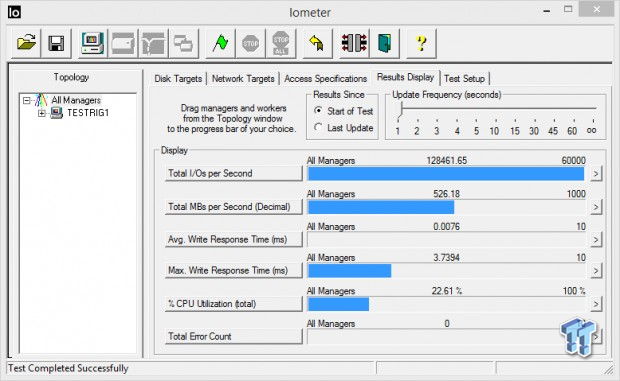
Read Response
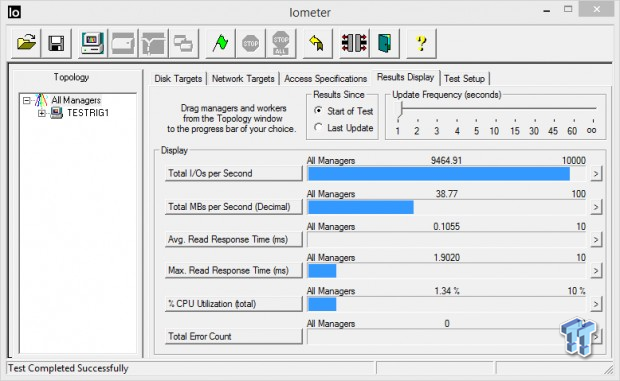
Average Disk Response
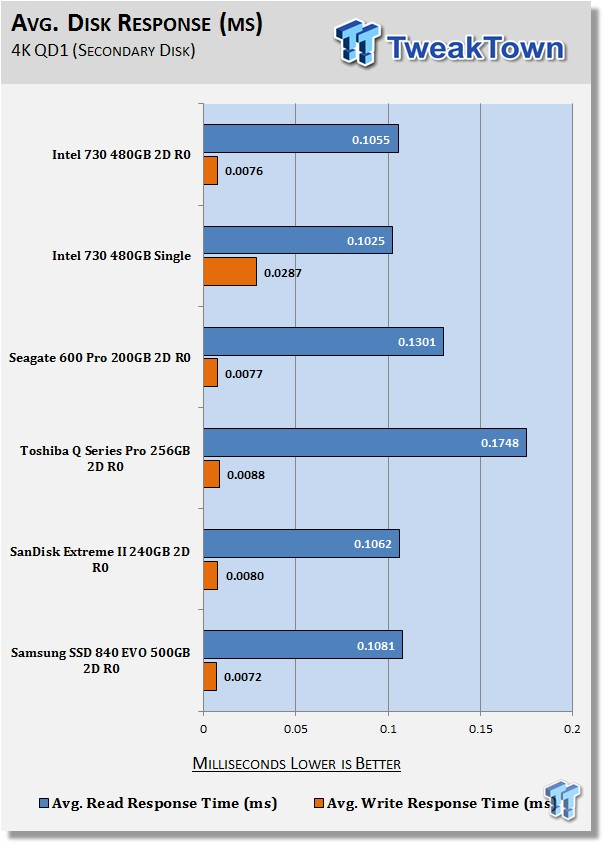
Write response times benefit most from RAID 0 because of write caching. There is a slight latency increase in read response times for an array versus a single drive. Response times are excellent. Read response is the best we've seen to date, and write response times are the second best we've seen to date.
DiskBench - Directory Copy
Version and / or Patch Used: 2.6.2.0
We use DiskBench to time a 28.6GB block (9,882 files in 1,247 folders) of mostly incompressible random data as it's transferred from our OS array to our test drive/array. We then read from a 6GB zip file that's part of our 28.6GB data block to determine the test drive/array's read transfer rate. The system is restarted prior to the read test to clear any cached data, ensuring an accurate test result.
Write Transfer Rate
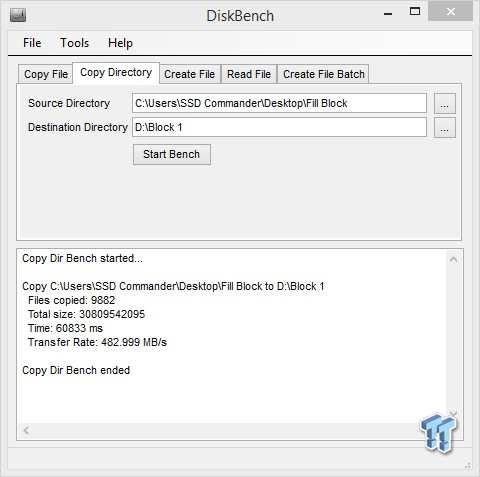
Read Transfer Rate
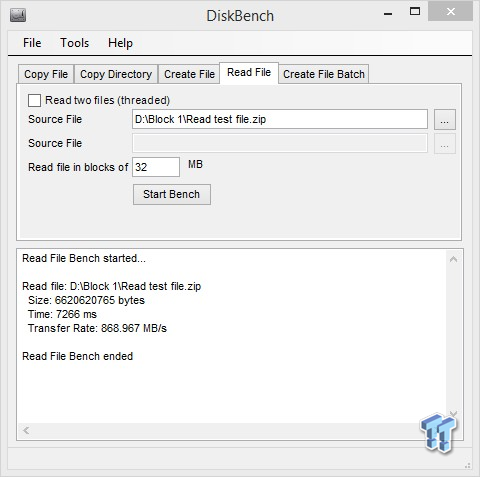
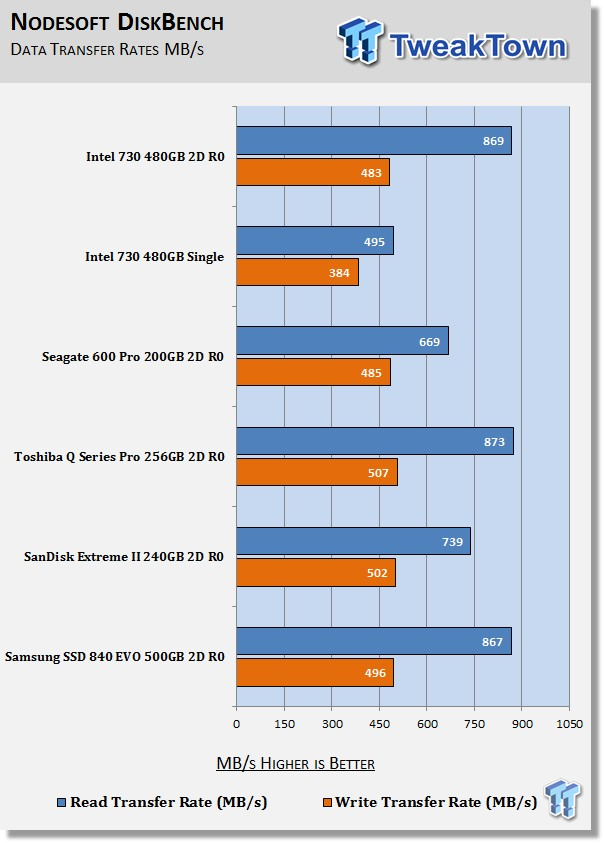
Our 730 array delivers our second best read transfer performance to date. Write transfer performance comes in last place; however, there is not a whole lot of difference between first and last.
Benchmarks (Secondary Volume) - PCMark 8 Extended
Futuremark PCMark 8 Extended - Consistency Test
Heavy Usage Model
We consider PCMark 8's consistency test our heavy usage model test. This is the usage model most enthusiasts, heavy duty gamers, and professionals fall into. If you do a lot of gaming, audio/video processing, rendering, or have workloads of this nature, then this test will be most relevant to you.
PCMark 8 has built-in, command-line executed storage testing. The PCMark 8 Consistency test measures the performance consistency and degradation tendency of a storage system.
The Storage test workloads are repeated. Between each repetition, the storage system is bombarded with usage that causes degraded drive performance. In the first part of the test, the cycle continues until a steady degraded level of performance has been reached (Steady State).
In the second part, the recovery of the system is tested by allowing the system to idle and measuring the performance with long intervals (TRIM).
The test reports the performance level at the start, the degraded steady-state, the recovered state, and the number of iterations required to reach the degraded state and the recovered state.
We feel Futuremark's Consistency Test is the best test ever devised to show the true performance of solid state storage in a heavy usage scenario. This test takes on average 13 to 17 hours to complete and writes somewhere between 450GB and 7000GB of test data depending on the drive(s) being tested. If you want to know what an SSD's performance is going to look like after a few months or years of heavy usage, this test will show you.
Here's a breakdown of Futuremark's Consistency Test:
Precondition phase:
1. Write to the drive sequentially through up to the reported capacity with random data.
2. Write the drive through a second time (to take care of overprovisioning).
Degradation phase:
1. Run writes of random size between 8*512 and 2048*512 bytes on random offsets for 10 minutes.
2. Run performance test (one pass only).
3. Repeat 1 and 2 for 8 times, and on each pass increase the duration of random writes by 5 minutes.
Steady state phase:
1. Run writes of random size between 8*512 and 2048*512 bytes on random offsets for 50 minutes.
2. Run performance test (one pass only).
3. Repeat 1 and 2 for 5 times.
Recovery phase:
1. Idle for 5 minutes.
2. Run performance test (one pass only).
3. Repeat 1 and 2 for 5 times.
Storage Bandwidth
PCMark 8's Consistency test provides a ton of data output that we can use to judge a drive's performance.
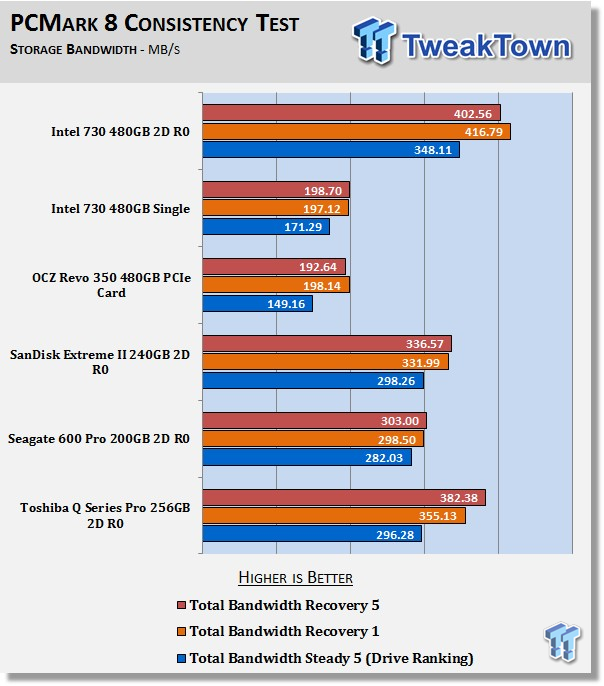
We consider steady state bandwidth (the blue bar) as our test that carries the most weight in ranking a drive's performance. The reason we consider steady state performance more important than TRIM is that when you are running a heavy-duty workload, TRIM will not be occurring while that workload is being executed. TRIM performance (the orange and red bars) is what we consider the second most important consideration when ranking a drive's performance. Trace based consistency testing is where true high performing SSDs are separated from the rest of the pack.
Like I stated earlier, IMFT Flash scales far better than Toshiba Flash does. You heard it here first. Our two-drive 730 series array manages to scale OVER 100 percent (write caching takes it over 100 percent); the best I've ever seen Toshiba Flash scale is 67 percent in an OS environment and in a steady state. What this means is that while Toshiba Flash based drives can outperform a single 730 series SSD, superior scaling gives our two-drive 730 array more performance than our Toshiba Flash based arrays. In case you are wondering, it is the flash, not magic firmware or the controller, that's producing the scaling we are seeing here.
How do I know? Because every IMFT Flash equipped array I've tested scales right about 100 percent, regardless of controller, brand, or BGA or TSOP packages; it simply doesn't matter. Here's the thing: the 730 is the first IMFT Flash based drive with enough base horsepower to defeat our Toshiba Flash based arrays. Our 730 series array soundly defeats the competition, becoming TweakTown's RAID performance champion.
We retired our 840 Pro array from this testing due to its inferior performance. In its place, I thought it would be interesting to see how a much-celebrated PCIe SSD would fair against our top arrays. As you can see, the Revo 350 480GB PCIe card with its 1800MB/s sequential performance, 4 controllers, and PCIe interface is no match for any of our arrays. In fact, the Revo 350 can't even muster enough performance to beat one 730, despite its nearly $2/gigabyte price tag.
I feel it is going to be quite a while before any consumer based PCIe card is going to be able to outperform a properly configured, high-quality two-drive SATA array. I believe it's going to take NVMe drives that can be put in RAID to defeat our SATA based arrays in an OS environment.
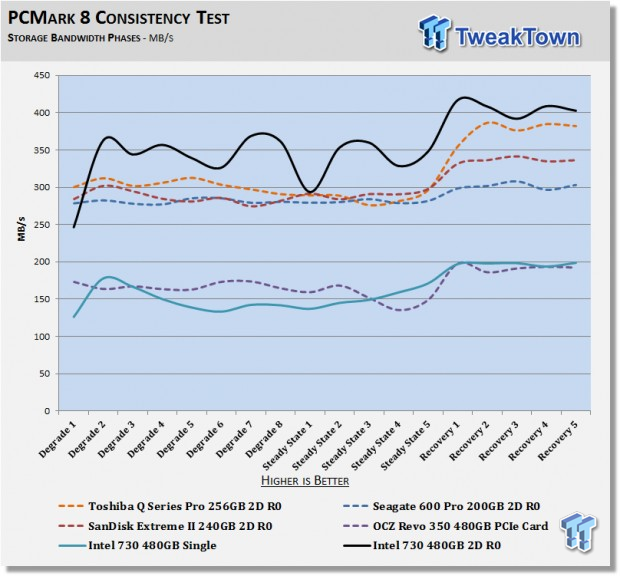
We chart our test subjects' storage bandwidth as reported at each of the test's 18 trace iterations. This gives us a good visual perspective of how our test subjects perform as testing progresses.
Total Access Time (Latency)
Access time is the time delay or latency between a request to an electronic system and the access being completed or the requested data returned. Access time is how long it takes to get data back from the disk. We chart the total time the disk is accessed as reported at each of the test's 18 trace iterations.
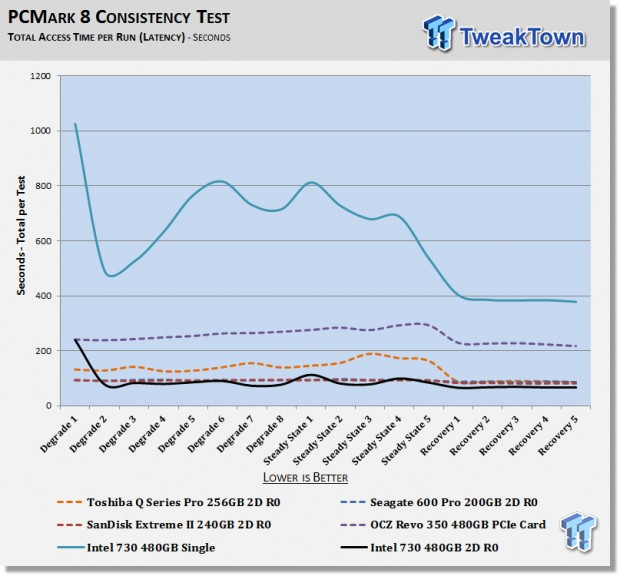
This is our clearest example of the benefits of RAID write caching. Latency improves on an order of magnitude in comparison to a single drive. This is not a function of scaling; this is a function of write caching that's not available for a single drive.
Disk Busy Time
Disk Busy Time is how long the disk is busy working. We chart the total time the disk is working as reported at each of the test's 18 trace iterations.
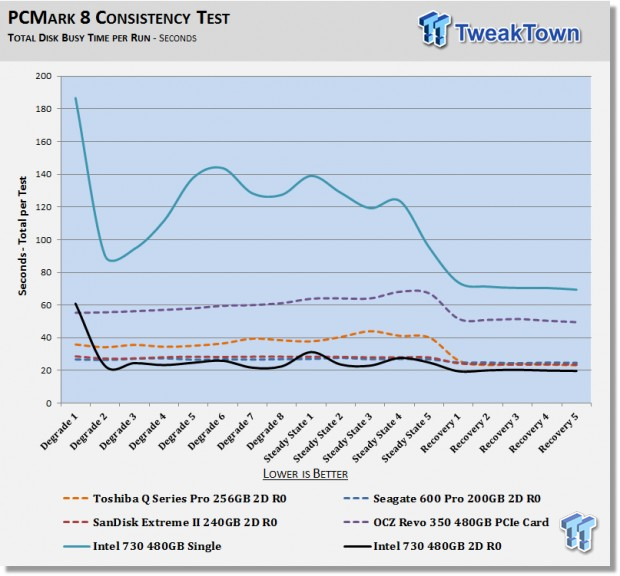
When latency is low, disk busy time is low as well. Our 730 array is able to spend up to six times less time working than a single 730.
Data Written
We measure the total amount of random data that the drives are capable of writing during the degradation phases of the consistency test. The total combined time that degradation data is written to the drives is 470 minutes. This can be very telling. The better the drives can process a continuous stream of random data, the more data will be written.
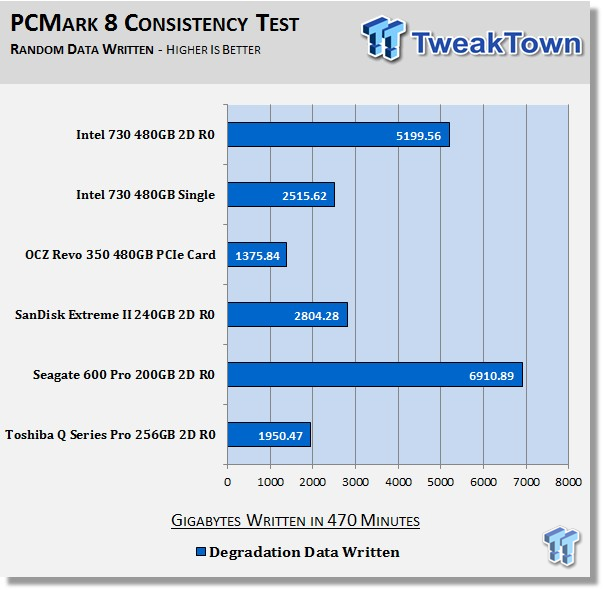
Our 730 array is able to write 5200 gigabytes of random data in 470 minutes. The 730's enterprise pedigree delivers great performance in this test; however, our heavily overprovisioned 600 Series Pro array can write more random data in the same amount of time. Again, the Revo 350 displays inferior performance in an OS environment; just keep that in mind when you hear how the Revo "breaks the SATA bottleneck."
Final Thoughts
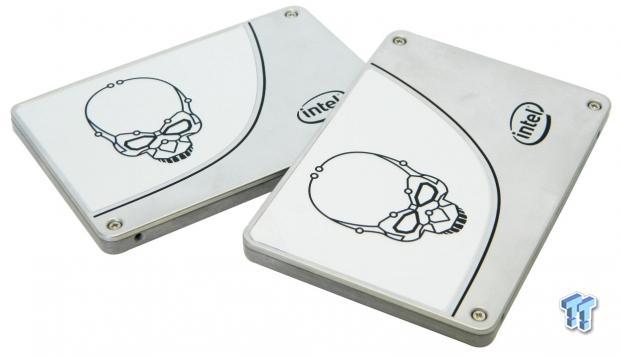
Solid state storage is the most important performance component found in a modern system today. Without it, you do not even have a performance system.
I really love Intel's decision to go for broke in the enthusiast sector. The 730 is an exquisite piece of hardware. Tapping an enterprise SSD like the DC S3500 is doing things the right way. I will gladly pay a premium to own superior hardware. Enterprise SSDs are engineered for performance in a steady state, a state that is inevitably reached by all solid state storage devices that are used on a regular basis. Because drives with an enterprise pedigree provide the best steady state performance, they make for a superior enthusiast class SSD, because enthusiasts will spend most of their cyber-lives with their solid state storage devices in a steady state.
Performance as measured in a steady state while running a workload is really the only metric that matters. Every major SSD manufacturer subscribes to this testing methodology as the true measure of solid state storage performance; however, at the same time, all we ever get from a consumer drive's spec sheet is its performance in an empty secondary attached FOB state. We need to go beyond the spec sheet to find true performance; the Revo 350 is a perfect example.
Most people look at the Revo's spec of 1800MB/s and think it is faster than everybody else when in reality it's one of the worst performing SSDs you could ever choose to load your operating system on. Sequential performance is actually one of the least important performance metrics for an operating system drive. Random 4k performance and low latency are what matters in an OS environment.
Right now, if you want bleeding edge performance, you will need to be running RAID; period. In fact, if you want to be the boss, you will need to be running at least a three-drive array on an Intel board. RAID is all about performance; I would never have my OS on anything but an array. Intel is pushing consumer based RAID with their 730 series. It makes sense that they would be pushing RAID because IMFT Flash scales so well.
The 730 is more expensive than most SSDs, and it does take an array to really deliver the goods, but deliver it does. As I look through my vast expanse of RAID data, I can tell you unequivocally that a 730 array is the fastest consumer based OS disk you can own at this time.
Putting two or more drives together in RAID provides you with storage that takes performance to the next level and is something I recommend you try. Think of it as the SLI of storage. Once you go RAID, there's no going back!
PRICING: You can find the Intel 730 Series SSD (480GB) for sale below. The prices listed are valid at the time of writing but can change at any time. Click the link to see the very latest pricing for the best deal.
United States: The Intel 730 Series SSD (480GB) retails for $437.27 at Amazon.
Canada: The Intel 730 Series SSD (480GB) retails for CDN$876.94 at Amazon Canada.
Australia: The Intel 730 Series SSD (480GB) retails for $650.99 AUD at Mighty Ape Australia.
New Zealand: The Intel 730 Series SSD (480GB) retails for $689.99 NZD at Mighty Ape NZ.


 United
States: Find other tech and computer products like this
over at
United
States: Find other tech and computer products like this
over at  United
Kingdom: Find other tech and computer products like this
over at
United
Kingdom: Find other tech and computer products like this
over at  Australia:
Find other tech and computer products like this over at
Australia:
Find other tech and computer products like this over at  Canada:
Find other tech and computer products like this over at
Canada:
Find other tech and computer products like this over at  Deutschland:
Finde andere Technik- und Computerprodukte wie dieses auf
Deutschland:
Finde andere Technik- und Computerprodukte wie dieses auf